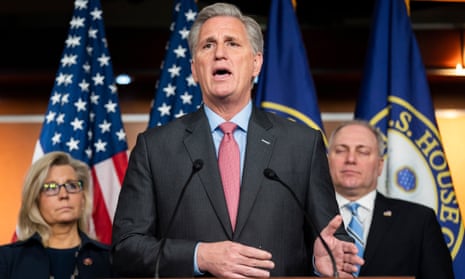Republican lawmakers under pressure to address the climate crisis are trying to move beyond denying the problem and start proposing solutions. But they still refuse to commit to what scientists say is necessary if the US is to rapidly cut back on burning fossil fuels.
A recent package of legislation proposed by House Republican leader Kevin McCarthy would encourage capturing climate pollutants from power plants but use them to drill for oil.
It would also lead to the planting of a trillion trees to absorb carbon emissions but also ramp up logging, an idea Donald Trump has endorsed.
“It’s greenwashing,” said Randi Spivak, public lands director at the Center for Biological Diversity, which organized a letter of opposition on the tree bill from dozens of environment groups to the House natural resources committee.
“The science is very clear,” Spivak said. “We need to slash our carbon pollution by 50% over the next 10 years if we want to avert the worst impacts of global warming and keep global warming to a 1.5C increase.”
The Republican party has seen a pendulum swing. In 2008, its election platform emphasized the importance of cutting emissions. By 2016, Donald Trump ran on a campaign of climate denial.
Now at least some prominent Republicans are breaking from the president and veering away from questioning the science and toward efforts that do not directly attack the coal, oil and gas industries. Facing pushback from the far right, on the other side of the aisle they are criticized by some Democrats who believe they are not proposing legislation in good faith.
Alex Flint, executive director of the Alliance for Market Solutions – a right-of-center organization that advocates reducing carbon pollution while growing the US economy – said the House bills were “directionally correct” but “need to grow to address the scale of our climate problem”.
Flint’s group backs revenue-neutral carbon tax and deregulation.
“I give [House Republicans] a great deal of credit for acknowledging the problem and stepping forward with proposals and recognizing that the politics of this has changed,” he said. “But also acknowledging that they are in the early stages of really substantive climate proposals.”
Bruce Westerman, an Arkansas Republican who introduced the trees bill, insisted his proposal would curb emissions even as it promotes logging.
When trees are cut down, they stop absorbing carbon. Westerman, a forester who worked for an engineering consulting firm in the timber, pulp and paper business, said forest managers would just plant them again.
Products made from the trees would pay for continual planting, he said, and the wood would be used for sustainable buildings with lower emissions footprints.
A scientist called to testify by Democrats, Yale ecology professor Carla Staver, strongly disagreed with Westerman’s proposals.
Forest management is an important way to fight climate change but it is not enough and it must be done properly, experts agree. A bill from Democrats would aim to conserve forests without increasing logging and by banning oil and gas drilling on public lands if climate emissions exceed targets.

Westerman told the Guardian Democrats should be working with Republicans who want to address climate change.
“Even someone who’s not a forester should be able to recognize an olive branch when they see one,” he said.
Even as Westerman defended his bill, the top Republican on his committee seemed to dismiss the overall effort.
At the beginning of the meeting, to which he was late, Rob Bishop of Utah suggested the elevators in House office buildings would be more timely under the rule of Benito Mussolini than they are with Democrats in charge. Democratic climate proposals, he said, offered not a “silver bullet” to fix the problem but “another bullet that is going to be used to shoot ourselves in the foot”.
He then showed a graph demonstrating how US heat-trapping emissions have declined over time.
While the Republican bills are far from aggressive, the right of the party is pushing back. The conservative Club for Growth Pac painted the package as “stifling liberal environmental taxes, regulations, and subsidies” and vowed to withhold support from any backers.
At the annual CPAC gathering near Washington, the climate change denial group the Heartland Institute presented a German teen activist who calls herself a “climate sceptic” as a foil to Greta Thunberg.
In Oregon, Republican state senators fled the state capitol in order to derail a climate change bill.
Despite that backdrop, the top Democrat on the House natural resources committee welcomed Westerman’s proposal. Raúl Grijalva said he hoped for a “new chapter”, focusing on solutions not denial.
He said: “For too long my friends on the other side of aisle denied that this was even a real issue. They would reject or even mock the overwhelming scientific consensus that climate is warming humans are responsible and urgent action needs to be taken.”
